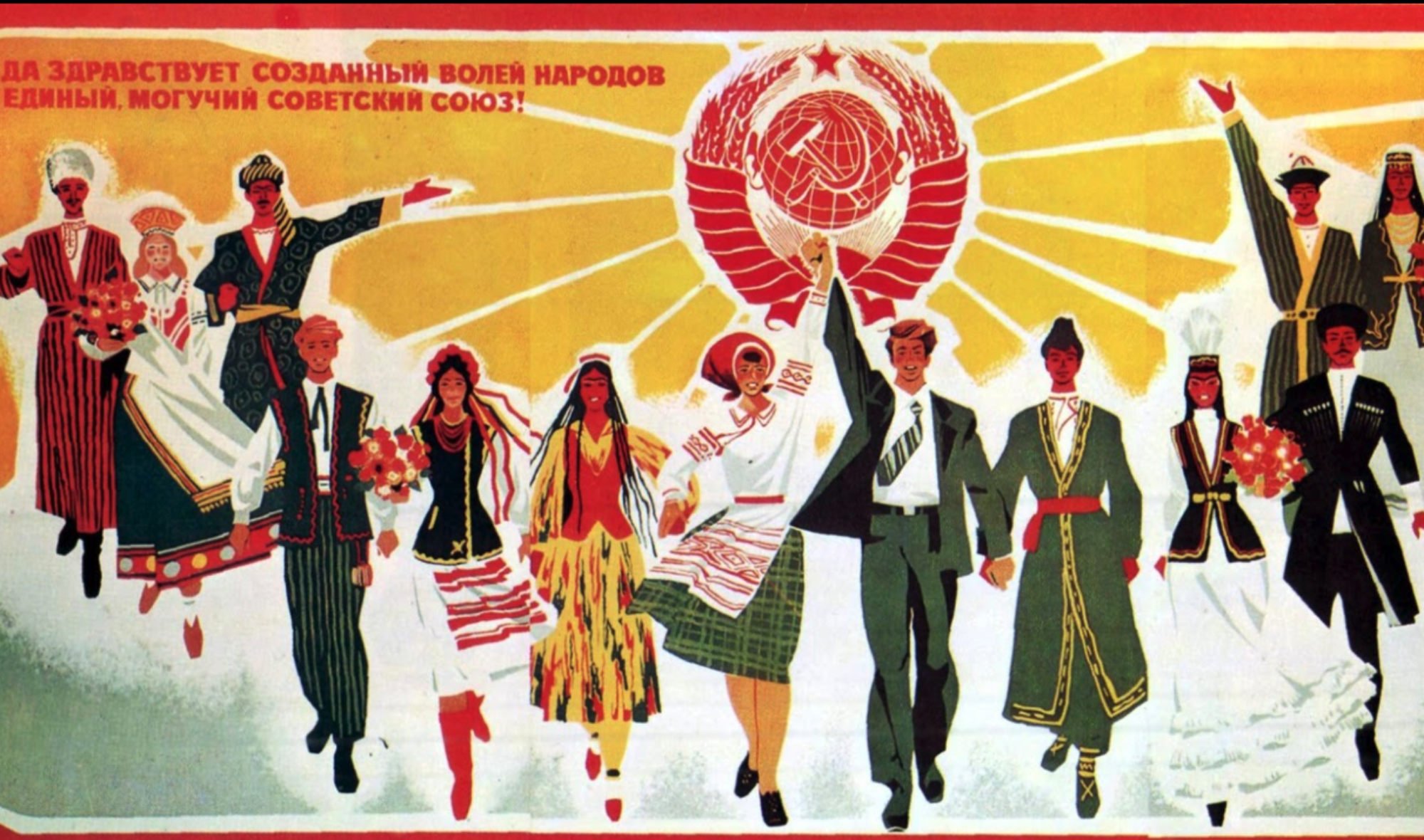Although it is really short, Lenin’s speech at the All-Russian Navy Congress really provides a window into how the Soviets will handle the all important question of culture that we started discussing last week. The date the speech was delivered, December 5, 1917, is something we should keep in mind in our discussion of the speech. This is just months after the October Revolution. At this point, I think it is safe to say Lenin had to be extremely careful to say the right things, even if that meant there had to be some compromise with his actual views. This speech spreads a message of unity while also still seemingly acknowledging unique cultures (ie Ukraine). So here is where my question comes in: In the speech Lenin says, “We are told that Russia will be divided, will split into separate republics. We should not be afraid of this. No matter how many separate republics are created we shall not be frightened by it. It is not the state frontiers that count with us but a union of toilers of all nations ready to fight the bourgeoisie of any nation.” Do you buy this? Is it possible to unify to “fight the bourgeoisie” without erasing some (or all) cultural elements that are not “Soviet” (when that becomes a thing)? Does Stalin’s speech contain a more thorough plan to carry out what Lenin is promoting, or is it something different?
Stalin & the Toilers
Out of all three of the readings I found Stalin’s speech, “The Political Tasks of the University of the Peoples of the East”, the most interesting. Stalin partially stylized the speech to assume the role of a “how to” manual on how to become part of the revolution and why certain countries are still under the grip of capitalism. Instantly he establishes an East vs West argument, the East where the Bourgeoisie no longer exist and who are free from colonial countries, and the West who still participate in capitalism and who allow the elitist Bourgeoisie to rule. I think his five step plan to incite revolutions in capitalist societies are interesting, with almost every aspect concerned with bolstering the Proletariats and keeping their best interest at heart (rather than the Bourgeoisie).
Two questions: What/who are the Toilers? Do you buy Stalin’s ideas on Model Republics?
Accidental Use of the Oppressor’s Tools?
Sydney Kightlinger
In The Soviet Union as a Work-in-Progress: Ethnographers and the Category Nationality in
the 1926, 1937, and 1939 Censuses, Hirsch spends a great deal of time explaining the preparation needed to survey the Soviet Union as government officials scrambled to figure out what Stalin would called “proletarian culture.” Although they were retained by the government, ethnographers who were trained in Imperial Russia were forced to throw out their old methods and design a census that did no depend on religion and or language. Soviet leadership had determined those old classifications were inaccurate markers of culture and nationality because of the “colonial practice of Russification” (255). However, there seems to still been a sense of colonization in the rhetoric used by Soviet officials after receiving the 1926 data: “In official discourse, natsional’nosti were “developed”
peoples, and narodnosti were still developing. This discussion of terms appeared in the “question and answer” pages of the journal as a device to educate party personal (167).
Maybe I am interrupting Hirsch’s language incorrectly, but does it not seem like she is suggesting that at certain points Soviet officials are attempting to form a collective using similar terms and techniques their oppressors had?
I am thinking specifically of her example of government intervention based on census data, page 266: “For example, a number of peoples who did not consider themselves Uzbeks were registered as such in 1926, presumably in order to buttress Uzbek claims to disputed territories. These peoples were then forced to adopt a new language and culture as their own.”
Lenin on the National Question
In Lenin’s speech to the All-Russian Navy conference, he answers the question of whether or not there was a plan to create one full Soviet State or have many smaller regions with their own cultures creating the Soviet State. Lenin suggests that this is not something to be feared, as the “tsarist regime” had banned uses of certain native tongue and caused a lot of hatred among people.
“We are told that Russia will be divided, will split into separate republics. We should not be afraid of this. No matter how many separate republics are created we shall not be frightened by it. It is not the state frontiers that count with us but a union of toilers of all nations ready to fight the bourgeoisie of any nation.”
Lenin goes on to describe how this technique would be used to “conquer Finland”, which he describes as letting the Finnish people exist as themselves but as a single piece of the whole Soviet Union. Do you think this example convinced Soviet citizens that they were all a part of one collective union?
The Struggle for a National Identity
In Terry Martins’, An Affirmative Action Empire: The Soviet Union as the Highest Form of Imperialism, he discusses the struggles between leaders Lenin, Stalin, Piatakov, and Bukharin on their ideologies on Internationalism and Nationalism. Lenin and Stalin, being described as “nation builders”, were pro-nationalism. Piatakov and Bukharin disagreed and believed Russia needed to have a stronger social identity and were both pro-internationalism. The Soviet Union at the time being a multi-ethnic nation, lacked a national identity.
The slogan, ” The Right to Nations to Self Determination” was a controversial phrase that would cause tension between both sides. On page 68, Martin discusses the opposition of nationalism from both Piatakov and Bukharin. He states:
“Once the proletariat had seized power, Piatakov maintained, national self-determination became irrelevant: “it’s just a diplomatic game, or worse than a game if we take it seriously… Class, rather than nationality, they both argued, was the only politically relevant
social identity in the post revolutionary era.” (Martin 68)
I do not think this is necessarily true. Generally speaking, the only worth a proletariat has to the society he or she lives in is the value of he or she’s labor; which isn’t worth much as compared to other groups in said society. The main goals of the proletariat is to remove the bourgeoisie, erase the division of social classes, and gain power in society. I don’t believe national self-determination becomes irrelevant. I think it becomes necessary because without the will to want to become more, then what’s the point of making the effort to do so? Granted, the bourgeoisie banked on the proletariat being oppressed. However, it’s almost contradictory for Piatakov and Bukharin to support internationalism when Russia did not even have a national identity. This leads me to question if the argument of whether nationalism was based on finding commonalities between both the proletariat and bourgeoisie and putting them on the same playing field? Was nationalism strongly opposed due to it’s categorical nature? Meaning, did the idea of placing two social/economical groups under the same category of nationalism threaten the idea of internationalism?
Nationalism: A tool for the Bourgeoisie to hide behind a common cause
In “An Affirmative Action Empire: The Soviet Union as the Highest form of Imperialism” the author brings up the conflict that Lenin and Stalin saw with Nationalism. In
Moreover, I think it is important to discuss who decides that a nation will follow in a certain Nationalism ideology? Furthermore, is Nationalism fluid- can you go most of your life believing you are Austrian- Hungarian, only to be told later in your life you are German? How does that change your allegiance to your nation and government?
Zoom Link for Remote Classes!
Here is the Zoom link you should use when we are meeting remotely. It is a “recurring meeting” link, so it will always be the same. Just click it when it’s time for class to start, and you will be magically transported to the wonderful world of HIS 315:
https://washjeff-edu.zoom.us/j/96119272918?pwd=K0EwWjFYSGFhUkRvR1V4V05vTWIvZz09
*We will be remote for all classes in Week 1-2 and all Wednesdays this semester. So far, we are planning to meet in hybrid mode (with some of you face to face with me in the classroom) on Mondays starting in Week 3. This is subject to change, as are so many things this semester. I will let you know about any changes as soon as I possibly can.
EDIT: As of Week 5, we will be remote for the rest of the semester.
Welcome, Cultural Constructors!
Welcome to HIS 315: Cultural Construction in the Soviet Empire! I’m glad to be taking this journey with you this semester. This WordPress site will be our home base for all of the remote parts of this class. Here, you can find the Syllabus, all assigned Reading & Viewing materials, the Discussion Leadership schedule, assignments, and writing resources. This is also where you will build your own webpages for your midterm projects. Most importantly, this is the home of our blog, through which we will work together to shape our intellectual journey. Please see the syllabus for details, and feel free to ask me if you have any questions. You can always reach me by email at lgoldman@washjeff.edu. Let the cultural construction begin!

